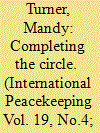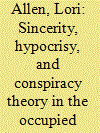| Srl | Item |
| 1 |
ID:
115324


|
|
|
|
|
| Publication |
2012.
|
| Summary/Abstract |
After nearly 20 years of negotiations and peacebuilding, Palestinians are no nearer to self-determination. This article explains this failure through an analysis of the context and peacebuilding framework created as a product of the Oslo Accords and the assumptions of Western donors about how peace would be achieved. It argues that the occupied Palestinian territory (oPt) is subject to an assemblage of colonial practices - some of which are the product of Western peacebuilding. While the practices of the occupying power, Israel, has constituted one part of the colonial equation (extracting and controlling resources and settling its own people), Western peacebuilding has played another through its pursuit of a modern version of the 'mission civilisatrice'. The ideological discursive framework that binds these two parts of the colonial equation together and gives them common purpose is the 'partners for peace' discourse that has been used to justify a multitude of practices, including the arrest and detention of Palestinian politicians, military action, the withdrawal of aid and regime change.
|
|
|
|
|
|
|
|
|
|
|
|
|
|
|
|
| 2 |
ID:
147888


|
|
|
|
|
| Summary/Abstract |
Concerns about lying and sincerity in politics are common in most societies, as are concerns about conspiracy theories. But in the occupied Palestinian territory, these concerns give rise to particular kinds of effects because of the conditions of Israeli occupation. Political theorists often interpret opacity claims and conspiracy theories as responses to social disorder. In occupied Palestine, disorder and instability are standard. Opacity claims and conspiracy theories therefore require a different kind of analysis. Through an examination of the semiotic ideology of sincerity, especially as it has emerged in the conflict between Fatah and Hamas, this article argues that opacity claims act as a form of nationalist pedagogy, at once reinforcing the basic principles of sincerity of action and word, and encouraging a wariness of political spin.
|
|
|
|
|
|
|
|
|
|
|
|
|
|
|
|